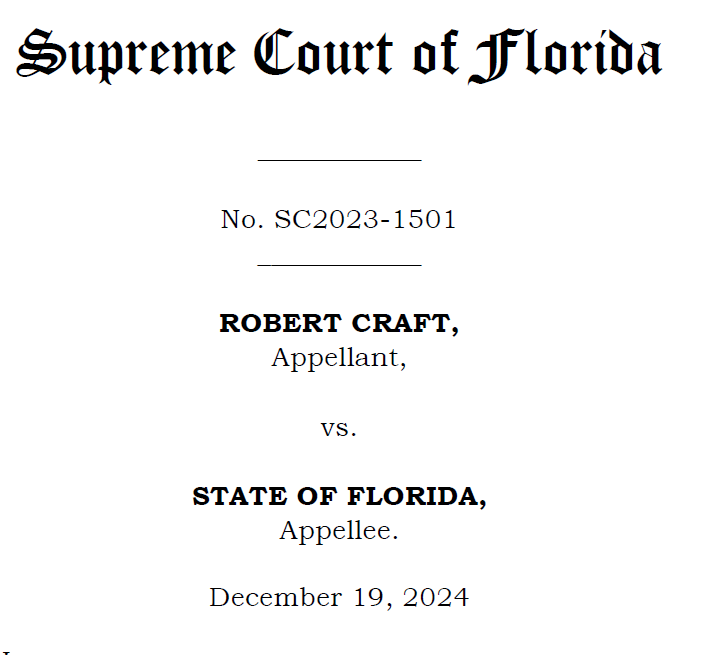Florida Supreme Court affirms denial of Robert Craft's initial postconviction motion
The Florida Supreme Court’s regular release of opinions today included Craft v. State, in which the Court affirmed the circuit court's denial of Craft's initial motion for postconviction relief.
The Florida Supreme Court’s regular release of opinions today included one decision: Craft v. State. The unanimous opinion was authored by Justice Sasso.
Robert Craft pled guilty and was sentenced to death for crimes that occurred in 2018. On direct appeal, the Florida Supreme Court affirmed Craft’s conviction and sentence.1
In November 2022, Craft filed an initial postconviction motion seeking relief from his conviction and sentence on six grounds:
(1) trial counsel was prejudicially ineffective in failing to seek a delay in the Faretta and change of plea proceedings (this ground also included claims that the trial court did not place Craft under oath before the plea colloquy and that if Craft had received all the State’s discovery he would not have pled guilty); (2) prosecutorial misconduct in failing to investigate claims that the Florida Department of Corrections (FDOC) guards wanted the victim to be harmed; (3) prosecutorial misconduct in failing to advise the court of the FDOC guards’ role in the killing of the victim as a possible mitigating factor; (4) the State committed a Giglio/Napue violation by advising the court that Craft could have no pretense of moral justification because there was no evidence the victim was a child molester; (5) Craft’s intellectual disability precluded imposition of the death penalty; and (6) cumulative error. Craft withdrew claim five during the Huff v. State, 622 So. 2d 982 (Fla. 1993), hearing.2
“[T]he circuit court summarily denied each of Craft’s claims.”3 Craft appealed the circuit court’s denial of his initial motion for postconviction relief, raising four claims why the circuit court erred:
(1) denying his claim for ineffectiveness of trial counsel for failing to delay the Faretta and change of plea hearings; (2) denying his claim based on prosecutorial misconduct for failing to investigate allegations that the guards wanted the victim to be harmed; (3) denying his claim based on prosecutorial misconduct for failing to advise the trial court of the guards housing him with the victim as a possible mitigating factor; and (4) denying his claim based on a misleading closing argument in violation of Giglio v. United States and Napue v. Illinois.4
In addition, Craft alleged cumulative error.
The Court began by addressing Craft’s first claim, which dictated the outcome of the rest of his claims. The Court determined that both portions of the claim fail. The Court then determined that Craft’s “second, third, and fourth claims fall with his first.” The Court stated that “each of Craft’s claims is predicated on discovery that Craft waived” and are, therefore, “procedurally barred and do not provide a basis for relief.” The Court further determined his claim for cumulative errors fails for the same reason.
The full opinion can be accessed on the Court’s website here.
Slip op. at 7.
Slip op. at 8 n.3.
Slip op. at 8.
Slip op. at 9 (footnotes omitted0.




